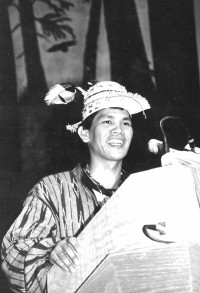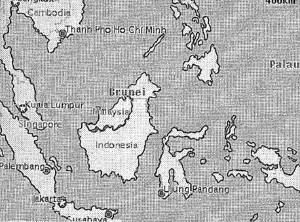
Addressing the U.N. General Assembly in New York, Dec. 1992
by Rahnghild Watson Reinartz

Addressing the U.N. General Assembly in New York, Dec. 1992
SIX YEARS AGO, MUTANG URUD OF THE KELABIT PEOPLE OF SARAWAK, FLED HIS HOME IN MALAYSIA. YEARS OF STRUGGLE TO BRING AWARENESS TO GOVERNMENTS OF THE WAYS IN WHICH THE INDIGENOUS PEOPLES OF SARAWAK WERE THREATENED-THEIR TERRITORY, THEIR COMMUNITIES, THEIR FAMILIES, THEIR HEALTH, THEIR CULTURE-TOOK MUTANG TO THE UNITED NATIONS AS A DELEGATE FOR THE REGION'S INDIGENOUS PEOPLES.
Now living in Victoria, Mutang continues to be active in issues related to his homeland, as well as being involved with Canada's First Nations. On this 50th anniversary of the United Nations Declaration of Human Rights, Voices talked with Mutang, a local human rights activist.
Voices What brought about your involvement as a human rights activist?
Mutang It's a personal issue. I was involved with our community where logging was taking place in the interior and the rights of our people to live in their traditional territory was not respected by the government and logging companies.
What direction did your involvement take?
In the mid '80s and early '90s the human rights and the environmental movements were linked and the issue of environment was critical surrounding the Rio Earth Summit 1992. The world came to know that we were a group of people who were defending our land through peaceful demonstrations from logging companies and a corrupt government. Hundreds of innocent people, including those who only knew life in the forests, were dragged into jail. For my involvement I was also jailed and put into solitary confinement. Through our movement I became an international source for media information. At one point, through a group of concerned Canadian and Swiss citizens, I was brought to other parts of the world to speak on the destruction of the rainforests, to meet with government figureheads, and to speak at the United Nations.
Now you're here in Canada, how are you involved with human rights issues?
My attraction to stay in Canada was that I see the First Nations' issues are very similar to where I come from where nation states are abusing or not respecting the rights of Indigenous People. I was interested to see the progression of Canada's relationship with aboriginal people and to see what determines a good relationship between the Nation and minority groups or the First Nations. I am also interested to see if I can bring anything I learn from First Nations here back to my country. I feel what the First Nations have gone through here is similar to what we will be going through.
I believe that I am in a very prophetic time here in Canada because I am witnessing what has been happening for 150 years or so, whereas, in my area it has only been happening for the last 10 or 15 years. I am witnessing what will happen to my people in the future with the abuses to the land, our history, and our culture. Therefore, I have been involved locally with "Rediscovery," a programme for Aboriginal youth from dysfunctional families that brings them back to being comfortable with the land.
Because you are distanced geographically from the issues of your country, is there ever a time when you say, enough, no more activism?
When you become far removed from your initial goal you become frustrated. I don't have the same passion now as when I was at home. But I have chosen not to contact people that I formerly worked with because that would put them in danger with the authorities. So I disconnected myself physically and at times mentally. Perhaps with the distance, I can find better solutions to the issue by seeing it in a more objective way.
I often ask myself, why me? I am just an ordinary person who just wants to live a normal life. I can't think of home all the time. It makes me sad and crazy. For now, I can't go home or I will be put into prison again. Often, I must rationalize to myself in order to get on with life here. I have to tell myself to accept the fact that, yes it's all in the past, I did the best I could for the situation at that moment. I am not saying I am forgetting everything. No! When the right time comes for me to return home, the same passion will certainly get its sparks again.
Actually, four years ago, I set up an organization in Vancouver called the Sarawak Peoples Campaign that produces video and campaign materials. I am still a resource person for issues regarding Indigenous Peoples and the tropical rainforests.
Do you feel that the UN and its Declaration of Human Rights works?
When we still see war and abuse everywhere on the nightly news, we have to ask ourselves whether this Declaration has done anything to improve the situation of human rights abuses over the past 50 years. It is difficult to measure. Human rights is a moral issue that has a universal appeal. The Declaration, says, whatever our colour, we human beings have a common goal in life which is to have freedom of movement, of ideology, freedom to carry on with our own way of life, however different.
As a person from a minority group directly affected by the atrocities of my government, I feel the UN should be more active to deal with our plight.Even in a so-called democratic country our voices are not heard. The UN should go into a country, have a fact-finding mission, observe what is going on and report on the situation. In my speech at the UN, I appealed to the President. I asked, "Why don't you go into a place where people are peacefully demonstrating? Do you go only when there is blood shed on the street?"
Sad to say, the UN has no money and not enough is yet done to have effective mechanisms to protect human rights of people everywhere.
How do you bring the Declaration of Human Rights to a local perspective?
I guess one way is to bring it to a personal level. If we have a good moral perspective of ourselves then we will not be abusive in our relationships with other people, their culture and community. The golden rule applies, "Do unto others as you want them to do unto you." As a society living with different ethnic realities, we must be more conscious of respecting our diversity.

I was fortunate to come to Canada at a time when the environmental issue was sexy. As an activist on tropical forest issues, I went right into the crowd of people who were organizing others in this community. These people were of different ethnic backgrounds and social classes, whose concerns were for the environment, housing, minority rights, neighbourhood development, etc. The issue wasn't about race or colour. But human rights abuses are often reflected in issues regarding economic inequalities, environmental degradation and racism.
My involvement in local organizations like "Rediscovery" is my way of understanding the impact of historical racism and underdevelopment in this country, and with VIRCS‹to empathize with people I share a common bond, because many of us are forced to leave our country for political reasons and settle in a strange place.
Mutang, is there anything that you want to share that we have not spoken about?
I am very passionate about issues of underdevelopment and poverty, how different levels of society are perpetuating racism and abusing the human rights of others. The western world thinks that abuses of human rights happen because there is not enough material wealth for people to live happily in their countries. But that is not true. Where I come from the issues are about respect for the different values and different ways of living. Even in British Columbia where the economy has been dependent upon natural resources, these resources are from traditional territories of the First Nations. For the interest of the state and the economy, the rights of the First Nations are infringed upon.